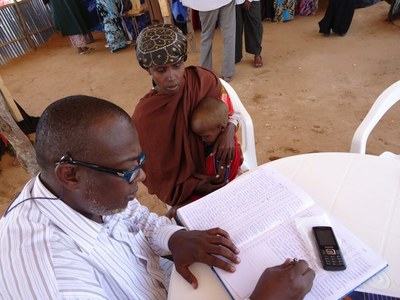East Africa Famine: Abdi makes a difference in Mogadishu

Six months after famine was declared across the Horn of Africa, SOS Children continue to provide vital medical services to keep families alive. SOS Health Worker Abdi has migrated 125 miles away from his family to help his fellow Somalis recover from the famine.
Abdi’s wife suffers from diabetes and often feels week, but with five children to care for and a husband who has taken work in another part of the country, she cannot afford to rest.
The children’s father, Abdi Muse Mumin, works 125 miles away for SOS Children in Somalia’s capital Mogadishu. The civil war that has dominated life in the country and a lack of job opportunities has meant that many breadwinners have no choice but to leave their family and take work wherever they can, sending remittances home so their family can afford to eat and go to school.
In the early 1990s, when Somali’s civil war and famine were rife, many of Abdi’s school friends left the country in pursuit of a better life in Europe and the U. S. At the time, he found employment as an administrator at the Pediatric Unit of the SOS Hospital in Mogadishu where he was inspired by the work of nursing students whom he observed.
Abdi recalls, in times of emergency, when resources were scarce how “everyone rolled up their sleeves and the ingenuity of professional staff and students from the SOS Community Nursing College saved children’s lives. Young teenagers suffered from gunshot wounds while intravenous drips kept starving infants alive”.
Inspired by his experiences, Abdi made the decision to train as a health specialist. After five years of training at the SOS Community Nursing School in Mogadishu, the reputation of Somalia’s only recognised nursing school enabled Abdi to go on to further specialist training in Kenya, where he later graduated with a diploma in Community Health. His experience led to his appointment as leader of the SOS Children Emergency Medical Programme in southern Somalia.
Today, in villages within a 90km radius of Baidoa, Abdi’s biggest challenge is to deal with malnutrition that affects an estimated 350,000 children in a country. Services are scarce, as the ratio of qualified nursing staff to chronically ill patients is the lowest in the world. The area is controlled by the Al-Shabab group, who recently asked most aid organisations to leave the region. With projects in the area for over 25 years, SOS Children were allowed to stay. However, the provision of supplies is severely restricted as the road between Mogadishu and Baidoa is often closed.
While her diabetes continues to afflict his wife many miles away, “she does not complain,” Abdi says. “She is a very good person who deals with the everyday problems. We are in regular contact by telephone, but conditions here make it very difficult to see my family. I have not seen them for several months – and I miss them very much.” For now, however, the family reunion is on-hold as Abdi works shoulder-to shoulder with his team, teaching his colleagues to care for even more vulnerable children and families.
How you can help
You can make a one-off donation directly to our Emergency Relief Programme in Somalia, or take out a child sponsorship to help us to focus on the long-term welfare of children who have no one to care for them as a result of the famine.

 Return to Schools Wikipedia Home page…
Return to Schools Wikipedia Home page…
